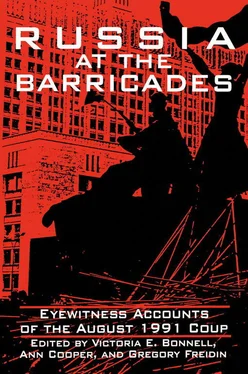But ineptness does not preclude brutality and may even facilitate it. A few days before the coup began, the plotters had placed an order for 250,000 handcuffs, and the Moscow police commandant had 300,000 arrest forms printed in advance. The plotters prepared a list of sixty-nine people, most of them public figures, who were to be arrested. Some of the men involved in the coup gave orders to arrest Yeltsin and shoot civilians at the White House. These orders were not obeyed, as we know now, because commanders such as Colonel General Grachev (subsequently appointed Russia’s Minister of Defense), Major General Lebed (subsequently the Commander of the Fourteenth Army), and Major General Viktor Karpukhin (at the time, Commander of the KGB’s anti-terrorist “Alpha” brigade, and under pressure from his subordinates) refused to shed the blood of their compatriots.
The internal security forces provide a particularly telling example of the plotters’ failure to mobilize key segments of the military behind their effort. Moscow policemen provided the nucleus of Yeltsin’s security forces during the coup. The staff and cadets at the Riazan Higher Police Academy and a Moscow platoon of the elite Specialized Designation Police Detachment—known by the Russian acronym OMON—threw their support behind Yeltsin.
Even more critical for the defeat of the putsch was the equivocation and noncooperation within the KGB. An interview with Major General Karpukhin later disclosed the extent of insubordination. According to Karpukhin, he first disobeyed orders on the morning of August 19 when he was instructed to arrest Yeltsin at his country house. Although he was in a position to make the arrest (“My vehicles were staked out around the entire settlement. All roads were blocked…”), Karpukhin nonetheless allowed Yeltsin to depart.
On the evening of August 19, Karpukhin participated in a secret meeting of commanding officers at the USSR Ministry of Defense. At that point, Karpukhin had operational command over elite forces numbering about 15,000 men. He described the plan of attack as follows:
At 3:00 A.M. the OMON divisions would clear the square [around the White House] and disperse the crowd with gas and water cannons. Our divisions were to follow them. On the ground and from the air, using helicopters with grenade launchers and other special equipment, we would take the building.
My boys were practically invulnerable. All this would have lasted fifteen minutes. Everything depended on me in this situation. Thank God, I did not lift a hand. Had there been a battle, there would have been a bloody mess. I refused. [24]
Karpukhin was not alone among top KGB officers who resisted the plan for attack. Other Alpha commanders shared Karpukhin’s view that the White House could easily be seized, but only at the cost of many casualties among the defenders. To be sure, some KGB officers were initially attracted by the putschists’ appeal. But by Monday evening, following the press conference of the Emergency Committee, they concluded (in the words of a KGB major general) that “this was a simple adventure, and the perplexing questions [about Gorbachev’s health] multiplied.” [25]A number of them viewed the coup as “unlawful and unconstitutional.” [26]
Insubordination in the police, the army, and the KGB, and especially in the elite units, prevented the putschists from carrying out their plans. [27]
The number of Muscovites who participated publicly in some aspect of the popular resistance during the three days of the coup has been estimated at as many as 500,000 (many more joined the victory rally on Thursday and the funeral on Saturday). Even this high figure represents only a small proportion of the city’s total population of eight or nine million.
Yet, within hours of the coup d’état, the junta’s claim to govern had been reduced to one issue: who would control the White House? In this context, a relatively small number of people—but enough to fill to overflowing the vast space around the structure—made a tremendous difference. They stopped the movement of tanks with barricades and with their own bodies. They fraternized with soldiers and officers. They protested in the Tuesday mass rally. They organized self-defense units around the White House on Monday and Tuesday nights.
By these acts, ordinary people helped to demoralize soldiers and their officers and to dissuade them from carrying out the junta’s orders. The attack on the White House ordered by the Emergency Committee never took place. Just as in the February Revolution of 1917, when the defection of the Cossacks sealed the fate of the “old regime,” so in this case defections among army, police, and KGB officers prevented the junta—the last holdover of the Communist old regime—from imposing its will on the country.
Although evidence on the situation in the provinces during these events is incomplete, we know that local governments supported Yeltsin in a number of key cities in the Russian Republic including Sverdlovsk, Voronezh, Khabarovsk, Tula, Novosibirsk, Rostov on Don, Arkhangelsk, and Yaroslavl. The fact is that opposition was considerable—enough to prevent the tanks from even entering Leningrad and to send signals to the plotters that compliance throughout the country could not easily be achieved.
The preceding years of glasnost and perestroika, with unprecedented opportunities for public activism, had prepared the ground for resistance to the coup. First, there was no longer only one center of power and authority in the country. Apart from the central state structure—the government of the USSR—there was now an elected government of the Russian Federation, and other republic-level governments as well. The government of Russia had become identified with the new social forces in the country struggling to liberate themselves from the Communist system. It stood for constitutionalism and democracy, headed as it was by a President chosen in an open and competitive election (the only Soviet leader on Russian territory to govern by a truly popular mandate). The junta, by contrast, was identified with the old regime seeking to perpetuate the hegemony, if not of communism, then of its self-selecting political elite, the Communist Party nomenklatura .
The August Revolution provided a major test of popular allegiance in Russia: would the people, including the officers and soldiers of the armed forces, side with Russia against the central authorities of the Soviet party-state? A potent mixture of democratic sentiments, Russian nationalism, and hatred for the Communist Party drove thousands of people into the resistance movement against the junta. In the words of a Leningrad protester, people “knew what could happen, they knew what this might lead to. They felt that they were people, human beings. They had stopped being afraid.” [28]
* * *
It is surely one of history’s great paradoxes that the August 1991 coup produced results diametrically opposed to the aims of the putschists. The coup was intended to prevent the signing of a new Union Treaty and decentralization of the Soviet Union. But in the aftermath of the coup, negotiations over the treaty faltered and, barely four months later, the USSR had ceased to exist.
The plotters, all of them high-ranking Communist officials, also sought to preserve the Party’s unique position in the country’s political and economic life. Their ill-conceived and poorly executed plan had precisely the opposite effect. The most immediate consequence was the dissolution of the Communist Party, whose activities were suspended in the Russian Republic on August 23 and in the entire Soviet Union on August 24. Though Party officials and organizations remained important actors in the months and years following the coup, the Communist Party of the Soviet Union—the country’s ruling party for more than seven decades—ceased to exit.
Читать дальше












